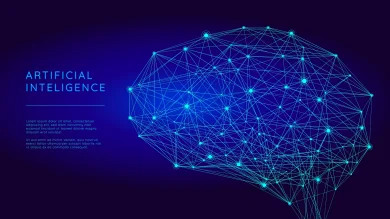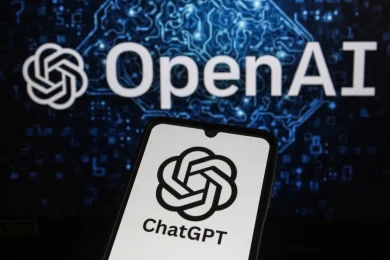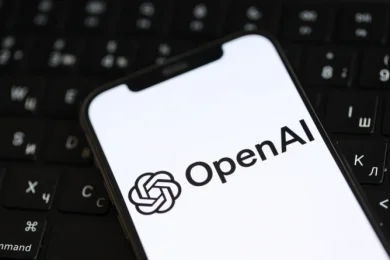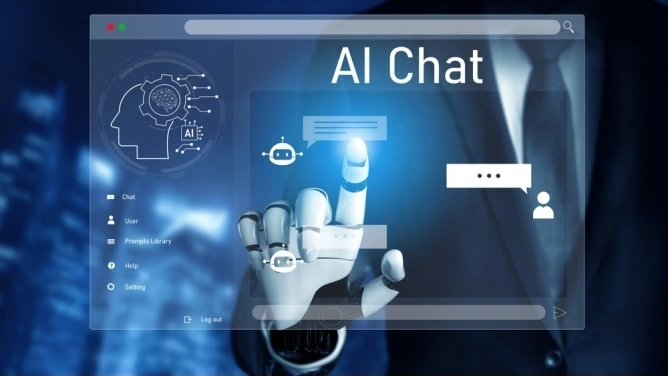
Major concerns: ChatGPT's safety systems can be bypassed to obtain instructions on chemical weapons
A detailed report by NBC News shows that models created by OpenAI, including internal versions of ChatGPT, provided instructions for making biological, chemical, or explosive weapons in tests after being manipulated through "jailbreak prompts." The tested open-source models, such as oss-20b and oss-120b, were particularly vulnerable, responding positively to dangerous requests at a rate of 97.2%.
Although OpenAI's flagship model (GPT-5) rejected such requests, vulnerabilities persist in the more extensive variants and in open-source models, raising serious concerns about the potential for abuse of AI technologies. The investigation highlights the need for much more robust safety mechanisms and clear regulations in the field.
Microsoft brings AI voice and vision to Windows: a new step towards the partner computer
Microsoft is launching a series of AI capabilities integrated into the Windows 11 operating system, through the "Copilot Voice" and "Copilot Vision" features. Users can say "Hey Copilot!" to initiate voice interaction and can optionally activate the vision feature, allowing the AI to "see" what is on the PC screen and provide real-time suggestions.
Microsoft's goal is to transform the computer into an "AI PC" where voice and vision become basic interaction modalities, alongside keyboard and mouse. Although these features are launched as activation options, they raise questions about privacy, as they involve broader AI access to screen content.
Emergency update: Microsoft releases a critical patch for millions of Windows users
Microsoft has confirmed the release of an emergency update for millions of Windows 11 users (versions 24H2/25H2) who have encountered serious issues related to the operation of "localhost." The reported defects prompted the company's rapid intervention.
It is recommended to promptly install the patch to fix potential errors and vulnerabilities. This situation reflects the importance of constant monitoring of operating systems and keeping security updates up to date.
Tech giants move production out of China: Microsoft, Amazon Web Services, and Google are reshaping supply chains
Major American tech companies have begun a major effort to reduce dependence on production and components from China, in response to geopolitical tensions and economic risks. Microsoft plans to move up to 80% of components for laptops, servers, and hardware out of China by 2026.
At the same time, AWS is exploring alternatives for printed circuit boards sourced from China, while Google is also expanding server production in Thailand and other regions. The transformation is vast: it includes parts, assembly, and logistics and presents major challenges, as China has the infrastructure and major suppliers for many critical components.
The implications are multiple: companies are seeking to diversify risks, but the global logistics infrastructure needs to be rebuilt. The change signals an important moment in the globalization of supply chains and in how strategic technology is delivered.
Energy costs rise for consumers due to the AI data center boom
Recent analyses show that areas near large data centers have recorded electricity rate increases of up to 267% in the last five years. A large part of this increase is attributed to the infrastructure needed to support massive computing centers for AI, but also to the costs of modernizing the electrical grid.
According to data, the average cost of electricity for households in the US has increased by about 13% since 2022, and AI-focused data center consumption could reach 6.7-12% of the country's total electricity consumption by 2028, compared to about 4.4% in 2023.
This trend raises challenges: who bears the costs – consumers, data center operators, or the public grid? There are signs of increasing pressure on the energy infrastructure, and local or state regulations may be forced to intervene to ensure balance between industry, consumers, and the environment.
WhatsApp bans general-purpose chatbots: what changes from January 15, 2026
The messaging application WhatsApp, owned by Meta Platforms, has announced a significant change to the terms of use for the Business API: starting January 15, 2026, general-purpose chatbots (e.g., conversational assistants based on large-scale models) will no longer be allowed if they represent the main functionality offered.
The stated goal is for the platform to remain focused on business-client communication and not on distributing conversational AI services as a primary product. This decision affects companies that have integrated or planned to integrate models like ChatGPT into WhatsApp Business.
PicSee: the new AI-based application for automatic photo sharing among friends
Indian entrepreneur Mayank Bidawatka, co-founder of the former social network Koo, has launched the PicSee application, available on iOS and Android, which aims to automate photo sharing among friends by automatically detecting faces in your gallery and sending them to friends you appear in, as long as you agree. The application operates on the principle of "mutual sharing": both friends must approve before the photos are shared.
All facial recognition processes are done locally on the device, and photos are not uploaded to the cloud, emphasizing privacy. Additionally, the user has a 24-hour review window before automatic sending occurs and can withdraw images if desired. This launch reflects a broader trend where social applications are moving from "public feeds" to private, automated, AI-centered exchanges, solving an identified "problem": many photos remain unshared on friends' phones.
WhatsApp limits the number of messages sent without response to combat spam
The messaging application WhatsApp is testing a new feature aimed at reducing spam: users and businesses will have a monthly cap on the number of messages they can send to destinations that have not responded. Each message sent to a contact that has not responded will be counted, and when the threshold is nearly reached, the user will receive a warning notification. The exact limit has not been disclosed, as it is in the testing phase in several countries.
The stated goal is to protect users from an avalanche of unsolicited messages, especially from business accounts or mass broadcasts, without affecting regular users who communicate with their contacts. Thus, the application aims to return to a personal messaging experience, reducing the noise generated by aggressive marketing or spam.
Meta prepares parental controls for AI experiences dedicated to teenagers
Meta has announced a package of new parental control tools for its artificial intelligence (AI) applications that will be available starting next year in the US, UK, Canada, and Australia. Among the new options is the ability for parents to completely disable one-on-one conversations between teenagers and AI characters, block individual characters, and receive information about the topics discussed by teenagers with the AI.
The company is responding to criticisms regarding AI interactions with minors, which have included inappropriate conversations. Meanwhile, Meta has stated that its general-purpose AI assistant will remain accessible but will operate under "PG-13" content standards for teenage users.
AI partnerships for Spotify
Spotify has announced partnerships with major record labels – Sony Music Group, Universal Music Group, Warner Music Group, along with independent distributors such as Merlin Network and Believe – to develop AI-generated music products that are "artist-first." The stated goal is for creators (artists, songwriters) to have a say in how and when AI tools are involved, and for the product not to compete with artists but to support them.
Declining traffic for Wikimedia Foundation, caused by AI-generated search summaries
The online encyclopedia Wikimedia Foundation (through the Wikipedia project) has reported an approximately 8% decrease in human visitors compared to the previous year, attributed to the way users access information: search engines are increasingly providing AI-generated answers without redirecting to the original site, and younger users are turning more to video on social platforms than to traditional websites.
The "zero click" practice – meaning the user finds the answer directly on the search page without accessing the site – is increasing. Thus, fundamental informational sites may become less visited, raising questions about their sustainability.
This evolution has profound implications: for the funding model of websites, for how academic or public information is transmitted, but also for the role of content editors in the era of generative AI.
Microsoft PowerToys brings automatic switching between light-dark mode in Windows 11
Microsoft has released a new utility within PowerToys – the "Light Switch" mode – which allows automatic switching between light and dark mode in Windows 11, either according to a schedule or based on sunrise/sunset in the user's location.
The feature is appreciated as a long-requested addition for (for example, in low-light environments) or battery saving on devices with OLED screens. But it also comes with precautions: there are reports of bugs in the current version that switch the theme unpredictably or even activate the feature without the user's consent.
AMD and OpenAI change the game in AI data centers
The partnership between AMD and OpenAI marks a new stage in AI infrastructure. AMD is expanding its collaboration with OpenAI to provide accelerators and specialized processors dedicated to data centers running next-generation artificial intelligence models.
Unlike previous agreements dominated by NVIDIA, AMD seeks to create a competitive ecosystem, offering high performance and superior energy efficiency. The project includes plans for a common architecture for AI training and task distribution between AMD Instinct processors and the new MI350 GPUs.
The impact is significant: OpenAI reduces its dependence on NVIDIA, while AMD strengthens its position as a strategic provider for global AI infrastructure.
Companies blame AI for layoffs, but experts say it's just an excuse
More and more companies are announcing layoffs "due to AI automation," but analysts say many are using the technology as a pretext for cost-cutting. In reality, replacing employees with AI is still limited, and job cuts are more likely due to internal restructuring.
A CNBC study shows that 37% of American firms mentioned AI in justifying layoffs since 2025, but only a portion have actually implemented automated solutions. Experts' conclusion: AI is often a "scapegoat" for economic or strategic decisions.
The public debate is becoming increasingly intense: some believe that automation is inevitable, while others say that behind the rhetoric of AI lies simple personnel cost reduction.
OpenAI builds its own AI processor with Broadcom
OpenAI has signed an agreement with Broadcom to produce its first dedicated chip for training artificial intelligence models. The initiative comes after the huge costs of NVIDIA GPUs and OpenAI's desire to control the technological supply chain.
The new processor, currently in prototype phase, will be produced by TSMC and could reduce dependence on traditional suppliers. This move is similar to what Google (with TPU) and Amazon (with Inferentia) have done.
This move transforms OpenAI from a simple model developer into a fully verticalized player – from hardware infrastructure to top software, strengthening its position against rivals in the AI ecosystem.
OpenAI accused of using legal subpoenas to silence critical organizations
OpenAI is accused of issuing legal subpoenas to nonprofit organizations that have criticized its practices regarding transparency and the safety of its models. The targeted NGOs claim that the company's actions aim to intimidate researchers and limit public disclosures about AI risks.
OpenAI denies the allegations, stating that the subpoenas only seek to obtain relevant documents for internal litigation. However, critics argue that this "legally aggressive" approach is incompatible with the company's promises of openness and collaboration.
The situation amplifies tensions between major AI companies and independent academic communities trying to objectively assess the safety and ethics of these models.
AI headshots change how candidates present themselves in the job market
AI-generated professional portraits are becoming an increasingly popular alternative to traditional photo shoots for resumes and LinkedIn profiles. New tools can create realistic images in minutes, at a fraction of the cost of a photographer.
However, recruitment specialists warn that a perfect portrait may seem fake and reduce the authenticity of the candidate. Platforms like LinkedIn have even begun to remove obviously generated or excessively retouched images.
The "Pixnapping" vulnerability allows 2FA codes to be stolen in 30 seconds
Researchers from the universities of Berkeley, San Diego, Washington, and Carnegie Mellon have discovered a vulnerability in Android that allows malicious applications to steal two-factor authentication (2FA) codes in two steps without special permissions.
The attack, called "Pixnapping," works by visually capturing the screen and extracting data displayed by applications such as Google Authenticator or Signal. Tests have shown that theft can occur in less than 30 seconds on some Google Pixel models.
Google has already issued a security update, but researchers warn that Android permissions need to be fundamentally rethought, as such attacks can completely bypass the traditional protection system.
Kayak launches AI mode for smart searches and bookings
The travel platform Kayak introduces a new AI-based search mode that allows users to ask natural questions – for example, "where can I go with €500 to a warm destination in November?" – and the system generates itineraries, flights, and hotels in real-time.
The feature uses language models integrated with data from the Kayak engine and is initially available in the US, Canada, and the UK.
The new approach marks a shift from classic search through filters to conversational experiences, where AI acts as a virtual travel agent.
Pinterest gives users control: they can limit AI-generated content in their feed
Pinterest is adding a new set of filters that allow users to control how much AI-generated content appears in their feed. Options range from "minimum" to "maximum," and the algorithm automatically adjusts the displayed results.
Thus, Pinterest becomes one of the first major platforms to offer transparency and granular control over AI-generated content – a likely direction for other social networks as well.
Arm and Meta partner to accelerate AI research
Arm Holdings and Meta have signed a collaboration agreement to optimize AI models at the hardware architecture level. The goal is for future Arm chips to run Meta models like Llama 3 and Llama Next more efficiently.
The partnership allows for tighter integration between the processor and the AI model, increasing performance and reducing energy consumption.
This alliance strengthens Arm's position in the AI ecosystem, showing that ARM-based architectures can effectively compete with NVIDIA and x86 solutions in the inference domain.
Apple launches M5 – a performance leap for iPad Pro, MacBook Pro, and Vision Pro
Apple has introduced the new M5 chip, built on a 2nm process, with enhanced performance and better energy efficiency. The new iPad Pro and MacBook Pro equipped with M5 promise 25% more battery life and a neural engine six times faster.
Additionally, the Vision Pro headset receives support for on-device AI features, including advanced gesture recognition.
With this generation, Apple emphasizes device autonomy and on-device AI experiences, avoiding reliance on the cloud for complex tasks.
OpenAI Sora brings Martin Luther King Jr.'s speech to life in an educational project
OpenAI has collaborated with The King Center organization to visually recreate, through the Sora model, a video interpretation of the famous "I Have a Dream" speech for educational purposes. The project uses video generation technology to recreate the historical atmosphere of the moment without replacing or manipulating King's real image.
OpenAI emphasized that the initiative is cultural and educational in nature, not commercial, and that all visual elements were created with the consent of the King family.
The project has sparked debates about the ethical use of positive deepfakes – when digital recreation serves education, not misinformation.
Anthropic integrates Claude into Microsoft 365 through a new official connector
Anthropic, the company behind the Claude chatbot, has launched an official connector for Microsoft 365, allowing companies to use AI in documents, emails, and spreadsheets.
Users can directly request summaries, text generation, and content analysis with Claude in Word or Outlook, in a manner similar to the Copilot integration.
This move strengthens Claude's position in the enterprise environment and marks the beginning of direct competition between Anthropic and OpenAI even within the Microsoft ecosystem.
Google simplifies account recovery: relies on contacts and phone numbers
Google is introducing a new account recovery method that allows users to add trusted people (Trusted Contacts) and associate a secondary phone number.
This change aims to reduce blocks when resetting passwords and offers a secure alternative for cases where the user no longer has access to the recovery email.
The new system will be gradually implemented as part of a broader strategy to secure digital identity and prevent unauthorized access.
RedMagic 11 Pro: the gaming smartphone with liquid cooling and an 8000 mAh battery
Chinese company Nubia has launched the RedMagic 11 Pro, a gaming phone with an impressive 8000 mAh battery and an active liquid cooling system – a first in the industry.
The device integrates the Snapdragon 8 Gen 4 chipset, a 6.8-inch OLED display at 165 Hz, and 150W fast charging.
The phone is aimed at gamers who want consistent performance and extended battery life, thus strengthening RedMagic's position in the premium gaming smartphone niche.
The UK launches the "Security AI Zero" initiative for cybersecurity
The British government has announced the launch of the "Security AI Zero" program, which aims to develop artificial intelligence models capable of detecting cyberattacks in real-time.
The initiative aims to protect critical infrastructure and reduce dependence on American solutions, positioning the UK as a European hub for AI security.
The program will be carried out in partnership with universities and private companies, being considered a strategic step in the global competition for digital security.
Adtalem and Google Cloud form an alliance for digital education
Education company Adtalem Global Education has signed a partnership with Google Cloud to implement AI solutions in its universities in the US and Latin America.
The collaboration includes tools for predictive analysis of student performance, educational content generation, and personalized adaptation of materials.
The goal is to reduce college dropout rates and provide a more interactive learning experience based on data and generative models.
ChatGPT slows down on mobile: downloads and daily usage decline
A data usage analysis study shows that the ChatGPT mobile application has a slowing growth in downloads and a decline in daily usage.
After the initial explosion in 2024, user interest has stabilized, especially in the face of competition – Claude, Gemini, Perplexity – and AI integrations from other applications.
Experts believe that mass adoption will shift towards natively integrated assistants (in iOS, Android, Windows), not standalone applications.
ByteDance expands AI chatbot globally
ByteDance, known for TikTok, is discreetly promoting the AI chatbot named Doubao in Asia, Europe, and Latin America.
The application offers similar functions to ChatGPT and is gradually integrated into the TikTok and CapCut ecosystem.
Without an official campaign, Doubao attracts millions of active users monthly – a sign that ByteDance could become one of the main rivals of OpenAI and Anthropic in the global conversational assistant market.
Real-time voice cloning vishing attacks: a new frontier of fraud
Researchers from NCC Group have demonstrated that modern voice cloning technologies can be used for real-time vishing (voice phishing) attacks.
By perfectly mimicking a person's voice, attackers have managed to obtain passwords, email address changes, and even financial confirmations.
Tests show that voice-based protection is becoming increasingly insecure, and companies need to adopt stricter multifactor authentication to prevent audio scams.
















